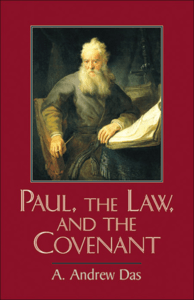
Paul the Law and the Covenant
The now familiar “new perspective” asserts that the “covenantal nomism” characteristic of second temple Judaism softened the Mosaic law’s requirement of perfect obedience. Because of God’s gracious covenant with Israel, manifested in election and the provision of atoning sacrifices, one could be righteous under the law despite occasional failures to obey the law perfectly. This view concludes that Paul, as a first century Jew, could not have been troubled by the law’s stringent demands, because it was generally understood that the gracious framework of the covenant provided a way of dealing with occasional lapses. Consequently, it is claimed, Paul’s problem with the law must have to do with its misuse as a means of enforcing ethnic boundaries and excluding Gentile believers. However, as Das demonstrates in this book, whenever the gracious framework of covenantal nomism is called into question, the law’s demands take on central importance. Das traces this development in a number of second temple Jewish works and especially in the writings of Paul. “Covenantal nomism” is probably an apt characterization of Paul’s opponents, and indeed of Paul’s past life; thus he can assert that formerly he was “blameless” under the law. But now Paul sees God’s grace as active only in Christ. He emphatically denies that God will show special grace in his judgment of Jews; to do so would be favoritism. Similarly, Paul sees no atoning benefit to the sacrificial system. In effect, Paul is no longer a “covenantal nomist.” Since the gracious framework of the covenant has collapsed, all that remains for Paul is the law, with its oppressive requirement of perfect obedience and ethnic exclusivism. Contra the “new perspective,” the “works of the law” should not be construed so narrowly as only the law’s ethnic exclusivity. Christ is “the end” of the law in general.
Endorsements:
This is a significant contribution to the ongoing discussion of the place of the Jewish law in the theology of the Apostle Paul. Aware of the new look in Pauline studies, and of the view of works-righteousness to which it is opposed, Dr. Das offers observations on a third way to view the law from the Pauline perspective. The argument is presented in a measured and judicious manner, and will repay careful reading.
– Paul J. Achtemeier, Union Theological Seminary
This book is an important exploration of the current debate about Paul s understanding of the Jewish Law in the light of the reevaluation of the issue connected especially with the scholarship of E. P. Sanders. Andrew Das reexamines the Jewish and Pauline texts and explores the nooks and crannies of the recent debates with a sharp eye for dubious arguments. He makes a good case that it is time to move beyond the covenantal nomism theory and combine Sanders s new perspective with a realization that Paul, after all, was concerned about self-righteousness.
– David M. Hay, Coe College
Andrew Das has written an ambitious and wide-ranging study that offers a serious sustained critique of the new perspective on Paul s teaching about the Law. He joins Schreiner and Westerholm in challenging the currently popular view of Dunn, Wright, and others that Paul s critique of Law is aimed primarily at Jewish particularistic nationalism. Das has done an impressive job of sifting through the voluminous secondary literature on Paul and the Law, forming intelligent critical judgments, and maintaining a consistent position of his own while engaging most of the key passages in Paul s letters. This book is a solid and professional piece of work that needs to be heeded in contemporary debates about Paul and the Law. I have certainly learned in reading it to be more nuanced in some of my own formulations.
Richard B. Hays, Duke University
Book Details:
Originally: Hendrickson Publishers
ISBN-10: 0801045991
ISBN-13: 978-0801045998
Release Date: November 1, 2001
Reviews:
- Perspectives Old and New On Paul (Eerdmans, 2004) – Stephen Westerholm
- Approaches to Paul (Fortress, 2009) – Magnus Zetterholm
- Interpretation (July 2004) – James D. G. Dunn
- Recherches de Science Religieuse 93/3 (2005) – J.-N. Aletti
- Theological Studies 65 (2004) – Marion Soards
- Southwestern Journal of Theology (Sept. 2003) – Siegfried S. Schatzmann
- Bible Today (Nov/Dec 2002)
- Nouvelle Revue Théologique 127/1 (2005) – J. Radermakers
- Trinity Journal 25/2 NS (2005) – Scott Hafemann
- Ashland Theological Journal (2004) – Nikola Galevski
- Reformed Theological Review 63/1 (April 2004) – Peter T. O’Brien
- International Review of Biblical Studies 49 (2002-2003)
- Themelios 28 (Summer 2003) – Geoffrey W. Grogan
- Theology Today 60 (April 2003) – Veronica Koperski
- Religious Studies Review 29/1 (Jan 2003) – Ian W. Scott
- European Journal of Theology 12 (2003) – Adrian Long
- Southern Baptist Journal of Theology 6 (2002) – Thomas R. Schreiner
- Master’s Seminary Journal (2005) – William D. Barrick
- Review of Biblical Literature (2004) – Jerry L. Sumney
- Review of Biblical Literature (2004) – James P. Sweeney